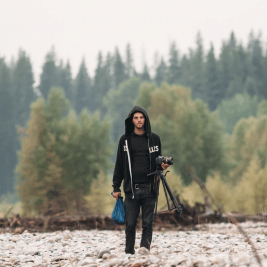In the UK in the seventies, there was a popular sitcom called ‘The Good Life‘ featuring two couples who live side by side in London suburbia. Margo and Jerry were everything you can expect from the social climbing mid-management classes who occupied these homes – well dressed, belonged to the right golf club, painfully aware of social etiquette. Tom and Barbara however were the complete opposite – country bumpkins who wanted to cultivate a life of self-sustainability, living off the land.
Unfortunately for Margo and Jerry, Tom and Barbara decided to do this by turning their suburban semi into a homestead, complete with chickens, pigs, and goats. Not for them an artificial lawn in North London – rather a veggie patch in Surbiton.
The sitcom has remained a classic favourite for generations of UK watchers, and in many ways, it tells a very bittersweet story of the pursuit of a long cherished dream. Urban living may not be everything, and moving to a more rural setting that provides more green and travel will actually release them from the pressures of modern life.
Over various episodes Tom and Barbara’s adventures were far from smooth sailing, with them facing derision from their neighbours, sabotage, running out of money, sacrificing various luxuries… but it was all played out with a dose of good humour and love.
Their experience might have been somewhat extreme. But a move from an urban to a rural community will bring with it challenges that you may not have previously expected. In this post, as part of our offMetro Blog, we try and prepare you for the worst here.
Prepare for the immediate culture shock sooner rather than later
The first challenge many city dwellers face when moving to the country is the culture shock. The pace of life is markedly different, with fewer people, quieter streets, and a stronger sense of community. Gone are the convenience stores open 24/7 and the endless array of entertainment options. Instead, there’s a greater emphasis on nature, outdoor activities, and neighborly interactions. Adjusting to this slower rhythm can be disorienting at first, but it’s also an opportunity to reconnect with oneself and appreciate the simple pleasures of life.
The noise – or lack of it – is one area that might actually catch your attention sooner rather than later. There is a certain background hum to city life that rises and falls during the course of the day and night. It becomes so much part of the landscape that you stop hearing it. Escaping to the country will heighten that lack of noise – to the point at which the lack of noise becomes deafening. You will eventually get used to it, but it couldl take some time.
Watch this video to get an idea:
Your corner shop is not a 24/7!
Your corner shop – if you are lucky enough to have one, will not be open 24/7 for your convenience. You’ll also find that the closest restaurant is a half-hour drive, and if your Apply Mac crashes, the company tends not to have branches open outside of grand metropoles.
Grocery runs become less frequent, as there’s no nearby supermarket to pop into for a quick restock. Additionally, access to healthcare and other essential services may require longer drives. However, this forces you to become more self-sufficient and resourceful, learning to make do with what’s available and appreciate the value of community support.
It’s a definite change to the pace and expectations of life, but one for the better.
Watch this to get a glimpse of how to get self-sufficient:
Make sure that your car is fit and running
If you ask when the next bus is due you are likely to be laughed out of the village. Public transport in rural areas has long been discontinued as part of an overall cost-cutting exercise. In the city, however, public transportation is often readily available, allowing residents to get around without the need for a car.
Owning a vehicle is an absolute necessity, which may not be quite akin to your desired green credential. From a practical point of view you need to be aware that driving longer distances will become a regular part of life. Even if you can justify the environmental impact of an electric vehicle, this in itself will throw up a range of issues, as many areas do not have the infrastructure to support charging away from the home.
For those accustomed to walking or taking the subway everywhere, adapting to a car-centric lifestyle can be a significant adjustment. However, it also opens up opportunities for exploration and adventure, as country roads lead to picturesque landscapes and hidden gems waiting to be discovered.
You can be lonely in a city, but have you ever been lonely in the country?
Many people complain about feeling lonely in cities. You can be surrounded by thousands of people 24 hours a day, yet you feel as though you are simply fading into obscurity and stop being noticed by people.
Despite this, in the city, there’s always something happening, and opportunities for social interaction abound. Moving to the country will make that pool of potential society shrink to a frighteningly narrow selection.
Rural areas can be sparsely populated, making it more difficult to meet people, especially for those who work from home or are retired. Building a social network takes time and effort, but it’s essential for maintaining a sense of connection and belonging. Getting involved in community events, joining clubs or organizations, and reaching out to neighbors are all ways to combat feelings of loneliness and isolation. But what happens if you are not accepted into the community?
To Conclude…
Moving from the city to the country is a journey filled with both challenges and rewards. It requires a willingness to embrace change, adapt to new ways of life, and appreciate the beauty of simplicity. While the transition may be difficult at times, the opportunity to reconnect with nature, build stronger community ties, and live a more fulfilling, authentic life makes it all worthwhile. So, to anyone considering making the leap from city living to country life, I say go for it. Embrace the challenges, savor the joys, and embark on a new adventure unlike any other.










 Sarah Knapp is a Brooklyn based entrepreneur whose love for the outdoors and community building led her to the October 2013 creation of OutdoorFest. She has a BA in History, is a Wilderness First Responder and a NY state hiking, camp and boating guide. Her proudest achievement to date is reading the Aeneid in Latin.
Sarah Knapp is a Brooklyn based entrepreneur whose love for the outdoors and community building led her to the October 2013 creation of OutdoorFest. She has a BA in History, is a Wilderness First Responder and a NY state hiking, camp and boating guide. Her proudest achievement to date is reading the Aeneid in Latin.  Allison was one of our first top writers and Chief Editor but is no longer working with offMetro. Allison is a native New Yorker, who has lived in Rome, Tuscany, Melbourne, Toronto and Los Angeles. She frequently contributed travel pieces to Family Travel Forum, using her own children as guinea pigs as they travel the globe. She never missed a chance to sample local delicacies, as her love for travel goes hand-in-hand with her love for food and wine.
Allison was one of our first top writers and Chief Editor but is no longer working with offMetro. Allison is a native New Yorker, who has lived in Rome, Tuscany, Melbourne, Toronto and Los Angeles. She frequently contributed travel pieces to Family Travel Forum, using her own children as guinea pigs as they travel the globe. She never missed a chance to sample local delicacies, as her love for travel goes hand-in-hand with her love for food and wine.  Josh Laskin is a freelance travel writer and photographer based in the White Mountains of New Hampshire. When he is not at work or on the road, you can find him in the mountains snowboarding, climbing, hiking, fly fishing, mountain biking, and eating bagel bites.
Josh Laskin is a freelance travel writer and photographer based in the White Mountains of New Hampshire. When he is not at work or on the road, you can find him in the mountains snowboarding, climbing, hiking, fly fishing, mountain biking, and eating bagel bites. Annie is a travel writer, environmentalist, and surfer based in Venice, CA. She heads up our West Coast team, keeps our grammatical errors in check, and makes sure our California writers always have a plan for their next
Annie is a travel writer, environmentalist, and surfer based in Venice, CA. She heads up our West Coast team, keeps our grammatical errors in check, and makes sure our California writers always have a plan for their next  Carly Pifer is a freelance writer who has been known to follow whims inspired by romantic movie scenes or colorful street style shots to India, Japan, Tunisia and Argentina. After stints living in Seoul, Boston, Paris and Los Angeles, writing and searching for something intangible, she landed somewhat steadily in Brooklyn and has begun to find inspiration in her more immediate surroundings.
Carly Pifer is a freelance writer who has been known to follow whims inspired by romantic movie scenes or colorful street style shots to India, Japan, Tunisia and Argentina. After stints living in Seoul, Boston, Paris and Los Angeles, writing and searching for something intangible, she landed somewhat steadily in Brooklyn and has begun to find inspiration in her more immediate surroundings.  Kate E. O’Hara is a New York based freelance writer and photographer who loves all things food—especially the people who make it and market it. Her writing aims to capture the essence of the food experience; the stories that go well beyond a plate of ingredients. In addition to her love of food, Kate is also known to have a hankering for red wine and craft beer. You can also find Kate on Instagram
Kate E. O’Hara is a New York based freelance writer and photographer who loves all things food—especially the people who make it and market it. Her writing aims to capture the essence of the food experience; the stories that go well beyond a plate of ingredients. In addition to her love of food, Kate is also known to have a hankering for red wine and craft beer. You can also find Kate on Instagram